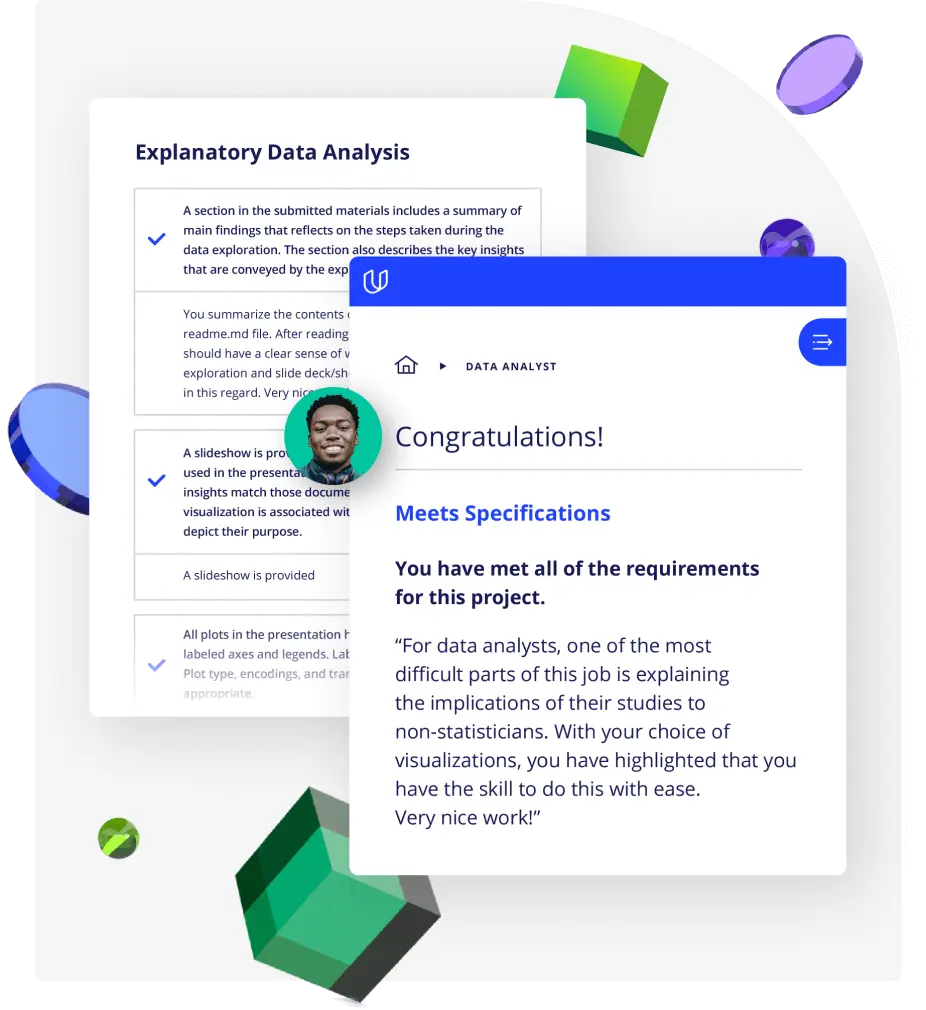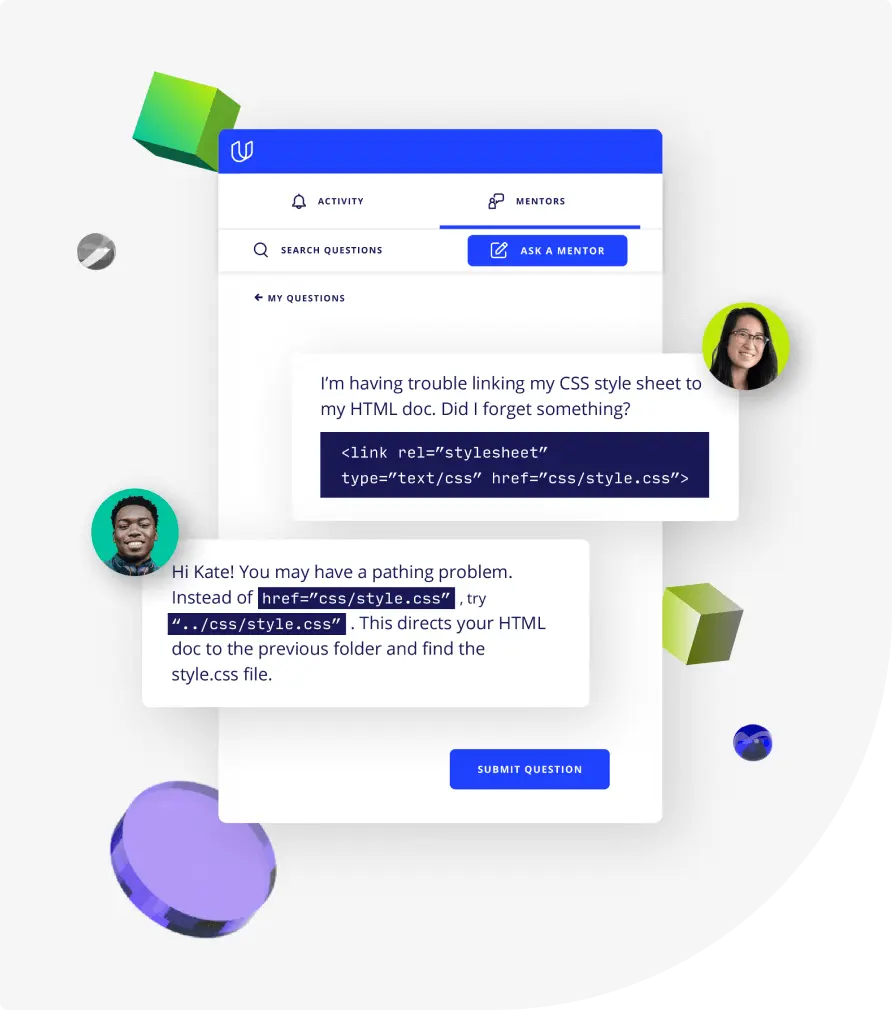Lesson 1
SQL Nanodegree Program Introduction
Welcome to the SQL Nanodegree program! In this lesson, you will learn more about the structure of the program and meet your instructors.

Nanodegree Program
Learn SQL. Master SQL, the core language for data analysis and enable insight-driven decision-making and strategy for your business.
Learn SQL. Master SQL, the core language for data analysis and enable insight-driven decision-making and strategy for your business.
Beginner
2 months
Real-world Projects
Completion Certificate
Last Updated March 13, 2024
Skills you'll learn:
Prerequisites:
Course 1 • 40 minutes
Welcome to the SQL Nanodegree program! Learn more about the pre-requisites, structure of the program, and getting started!
Lesson 1
Welcome to the SQL Nanodegree program! In this lesson, you will learn more about the structure of the program and meet your instructors.
Lesson 2
You are starting a challenging but rewarding journey! Take 5 minutes to read how to get help with projects and content.
Course 2 • 4 weeks
SQL is one of the most versatile tools available for extracting insights from stored data. Learn how to execute core SQL commands to define, select, manipulate, control access, aggregate, and join data and data tables. Understand when and how to use subqueries, several window functions, and partitions to complete complex tasks. Clean data, optimize SQL queries and write select advanced JOINs to enhance analysis performance, explain which cases you would want to use particular SQL commands, and apply the results from queries to address business problems.
Lesson 1
Lesson 2
In this section, you will gain knowledge about SQL basics for working with a single table. You will learn the key commands to filter a table in many different ways.
Lesson 3
In this lesson, you will learn how to combine data from multiple tables together.
Lesson 4
In this lesson, you will learn how to aggregate data using SQL functions
Lesson 5
In this lesson, you will learn about subqueries, a fundamental advanced SQL topic. This lesson will walk you through the appropriate applications of subqueries, the different types of subqueries, and review subquery syntax and examples.
Lesson 6
Cleaning data is an important part of the data analysis process. You will be learning how to perform data cleaning using SQL in this lesson.
Lesson 7
Window functions allow users to compare one row to another without doing any joins using one of the most powerful concepts in SQL data analysis.
Lesson 8
Learn advanced joins and how to make queries that run quickly across giant datasets. Most of the examples in the lesson involve edge cases, some of which come up in interviews.
Lesson 9
Lesson 10 • Project
In this project, students will be putting their SQL skills to the test to help determine where to concentrate efforts to combat deforestation.
Course 3 • 4 weeks
Databases need to be structured properly to enable efficient and effective querying and analysis of data. Build normalized, consistent, and performant relational data models. Use SQL Database Definition Language (DDL) to create the data schemas designed in Postgres and apply SQL Database Manipulation Language (DML) to migrate data from a denormalized schema to a normalized one. Understand the tradeoffs between relational databases and their non-relational counterparts, and justify which one is best for different scenarios. With a radical shift of paradigms, learn about MongoDB and Redis to get an understanding of the differences in behaviors and requirements for non-relational databases.
Lesson 1
Get introduced to database management systems, as well as learning the difference between relational and non-relational databases.
Lesson 2
Find out about the different forms of normalized data for optimizing database storage.
Lesson 3
Learn about the data definition language, such as creating tables and different data types.
Lesson 4
Dive into the data manipulation language in order to alter existing tables and data.
Lesson 5
Find out how to keep consistency amongst your data by adding constraints.
Lesson 6
Maximize your database performance by using indexes when and where appropriate.
Lesson 7
With your relational database skills in hand, you’re ready for a look into the other side of data, with non-relational databases.
Lesson 8 • Project
Investigate a poorly designed database for Udiddit, a social news aggregator. You’ll design a new, normalized and performant database and migrate over data from the previous database.
(Optional) Course 4 • 1 day
The Careers team at Udacity is here to help you move forward in your career - whether it's finding a new job, exploring a new career path, or applying new skills to your current job.
Lesson 1 • Project
Find your next job or connect with industry peers on LinkedIn. Ensure your profile attracts relevant leads that will grow your professional network.

Software Developer and Co-Founder DecodeMTL
Ziad is a seasoned software developer who loves mentoring and teaching. Currently working as an independent contractor, he previously co-founded and taught full-stack web development at DecodeMTL, Montreal's first web development bootcamp.

CEO at Mode
Derek is the CEO of Mode Analytics. He developed an analytical foundation at Facebook and Yammer and is passionate about sharing it with future analysts. He authored SQL School and is a mentor at Insight Data Science.

Senior Product Manager at CircleUp
Malavica is a Senior Product Manager with over five years of experience. Her work includes building Helio, an ML platform used to identify breakout brands in early-stage consumer packaged goods companies.
Average Rating: 4.6 Stars
265 Reviews
Malik A.
April 6, 2023
This program is designed and implemented in professional way !
Kelvin M.
February 8, 2023
The program is a good match, easy where it needs be, hard where it needs be, to prepare someone in a good career path.
Pablo S.
January 14, 2023
My expectations are very good, I am happy to have pursued this program as it has help me to have adquired the foundational and practical SQL skills I needed.
Anonymous
November 27, 2022
Yes I have been learning a lot very quickly.
Tatiana P.
October 27, 2022
First of all, I’d like to thank you for the program. Globally, I enjoyed my experience, and I obtained many useful skills related to the designing/manipulating of relational databases. I especially appreciated the second part of the course (on Management of Relational and Non-relational Databases) which I found very clear, structured and well-explained. I also found the two projects extremely interesting. I progressed a lot thanks to them. What could be improved about the course is the first part (on the Introduction to SQL) that I found rambling and not quite clear to understand. Moreover, I found that the 3-hour-chapter on indexes and the chapter on non-relational databases were not really necessary for the scope of this course. They could have either been optional or put into another more advanced technical course. Thank you again for this opportunity! I enjoyed this learning journey!
Combine technology training for employees with industry experts, mentors, and projects, for critical thinking that pushes innovation. Our proven upskilling system goes after success—relentlessly.

Demonstrate proficiency with practical projects
Projects are based on real-world scenarios and challenges, allowing you to apply the skills you learn to practical situations, while giving you real hands-on experience.
Gain proven experience
Retain knowledge longer
Apply new skills immediately

Top-tier services to ensure learner success
Reviewers provide timely and constructive feedback on your project submissions, highlighting areas of improvement and offering practical tips to enhance your work.
Get help from subject matter experts
Learn industry best practices
Gain valuable insights and improve your skills

Full Catalog Access
One subscription opens up this course and our entire catalog of projects and skills.
Average time to complete a Nanodegree program
4 weeks
, Beginner
(1194)
2 months
, Beginner
(47)
2 months
, Beginner
3 weeks
, Beginner
(807)
2 months
, Beginner
3 months
, Beginner
3 weeks
, Beginner
(124)
5 months
, Beginner
3 months
, Beginner
(80)
4 months
, Advanced
(449)
4 months
, Intermediate
4 weeks
, Intermediate
(88)
3 months
, Beginner
(498)
3 months
, Intermediate
(272)
2 months
, Intermediate
4 weeks
, Beginner

SQL
4 weeks
, Beginner
(1194)
2 months
, Beginner
(47)
2 months
, Beginner
3 weeks
, Beginner
(807)
2 months
, Beginner
3 months
, Beginner
3 weeks
, Beginner
(124)
5 months
, Beginner
3 months
, Beginner
(80)
4 months
, Advanced
(449)
4 months
, Intermediate
4 weeks
, Intermediate
(88)
3 months
, Beginner
(498)
3 months
, Intermediate
(272)
2 months
, Intermediate
4 weeks
, Beginner